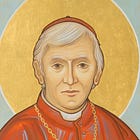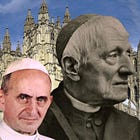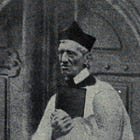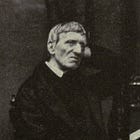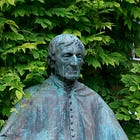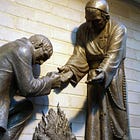'Aboriginal Vicar of Christ' – Answering Bishop Sanborn’s accusations against Cardinal Newman
Bishop Sanborn alleged that Newman said conscience was ‘the Vicar of Christ in your soul’ – but this seriously misrepresents what Newman said, and what he said about ‘after-dinner toasts.’
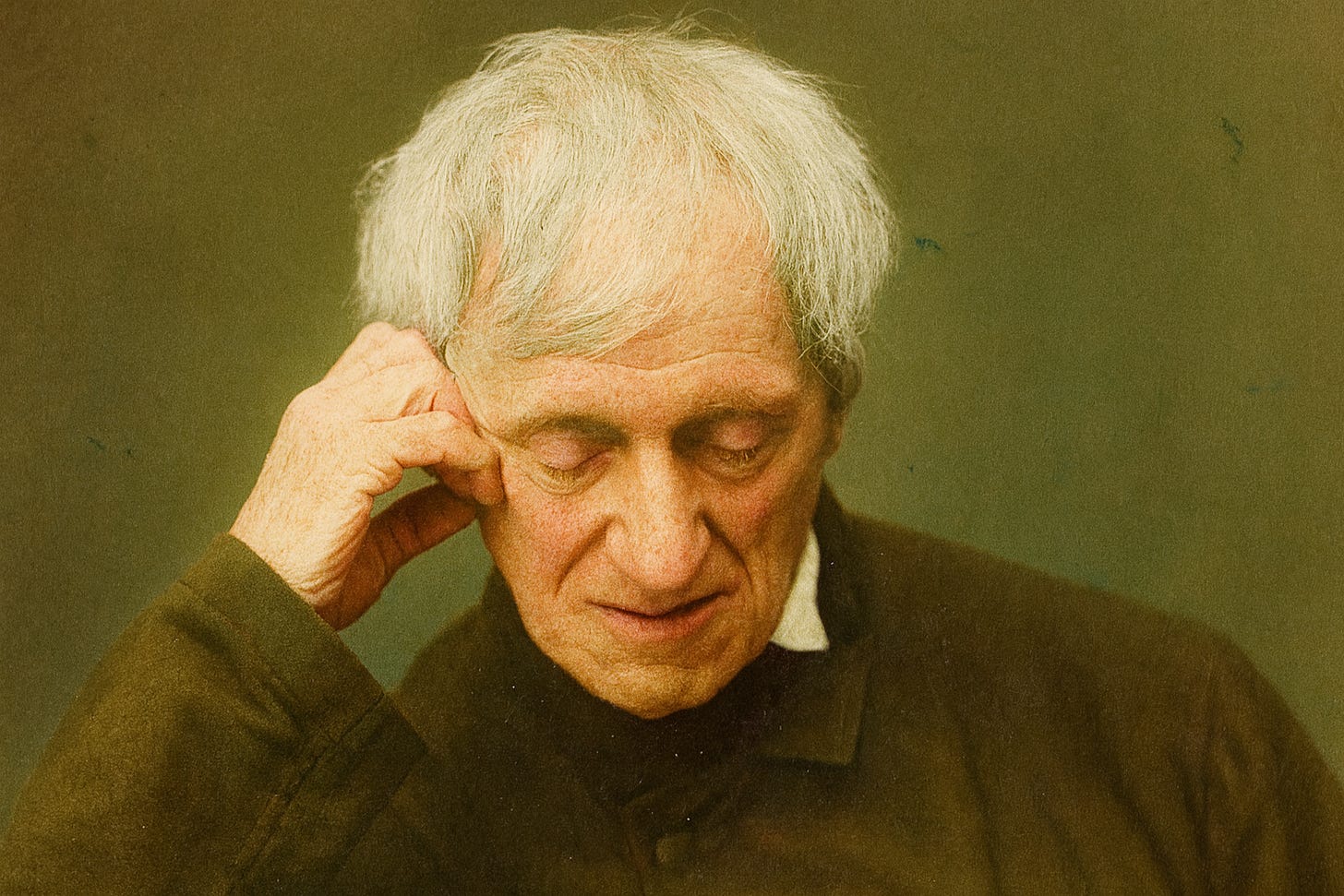
Bishop Sanborn alleged that Newman said conscience was ‘the Vicar of Christ in your soul’ – but this seriously misrepresents what Newman said, and what he said about ‘after-dinner toasts.’
Bishop and Cardinal, Part IIb
Introduction
In the previous pieces, we have been analysing Bishop Donald Sanborn criticisms of Cardinal Newman, made in a November 2023 reaction video published by his seminary’s YouTube channel.1 This video dealt with the requirements for salvation, and consisted of Bishop Sanborn and an interviewer reacting to numerous clips of an interview between Bishop Robert Barron and Ben Shapiro. The relevant transcript is available in full in Part I.
The first piece considered the Bishop’s claim that Newman’s view of conscience was “precisely modernist.”
The second piece defended Newman’s proof for the existence of God, and his use of the the phrase “Voice of God,” against accusations of modernism.
In this part, which originally formed one article with the previous – I will consider the bishop’s criticisms of Newman’s language – in particular, those based on:
Newman calling conscience “the aboriginal Vicar of Christ”
Newman and saying that he would offer a toast to conscience before the Roman Pontiff.
As we have already seen that Bishop Sanborn is mistaken in his characterisation of how Newman understood conscience, it is prudent for us now to be on our guard with regard to his criticisms, and consider whether the he may have also misunderstood other relevant matters. As we shall see, this is indeed the case.
Bishop and Cardinal Mini-Series
Part I: Is Cardinal Newman’s idea of conscience ‘precisely modernist,’ as Bishop Sanborn claims?
Part IIa: Bishop Sanborn, and Cardinal Newman’s ‘Proof from Conscience’
Part III: Bishop Sanborn’s attempt to link Cardinal Newman with Baron von Hügel
‘The aboriginal Vicar of Christ’
Newman' notoriously referred to conscience as the “aboriginal Vicar of Christ.” Here is what he said:
“Conscience is not a long-sighted selfishness, nor a desire to be consistent with oneself; but it is a messenger from Him, who, both in nature and in grace, speaks to us behind a veil, and teaches and rules us by His representatives.
“Conscience is the aboriginal Vicar of Christ, a prophet in its informations, a monarch in its peremptoriness, a priest in its blessings and anathemas, and, even though the eternal priesthood throughout the Church could cease to be, in it the sacerdotal principle would remain and would have a sway.”2
Is this specific language – namely calling conscience the “aboriginal Vicar of Christ,” and treating conscience as “a messenger” from God – a problem?
We have already demonstrated that Newman’s understanding of conscience is identical to Bishop Sanborn’s, and drawn from St Thomas Aquinas and the traditional theology of the Church. We have also already addressed the legitimacy of using figurative language in controversy.
To continue:
First, we should note that adjectives qualify the nouns to which they are attached – and that the adjective used is “aboriginal,” rather than “mental”, “internal”, or – in Bishop Sanborn’s inaccurate paraphrase, “the Vicar of Christ in your soul.”
The word “aboriginal” comes from the Latin words ab origine, which means “from the beginning,” or “primaeval.” Newman uses the word in a discssion of the natural law and natural morality – which are distinct from and prior to matters of faith. However, stating that Bishop Barron’s analysis of Newman’s thought is accurate, Bishop Sanborn characterises the text as follows:
“[Bishop Robert Barron is] giving this idea of conscience as exactly what Newman says, it’s the Vicar of Christ in your soul.
“Well that is, that means, why do we need a pope if we have the vicar of Christ in our souls? Why do we need a church? This is pure Protestantism. This is free examination of the scriptures – the Holy Ghost comes and tells me what I should think. Well, why do we have a Church? Why did St Peter receive the keys? Why is there the magisterium of the Church?
“And as I said, conscience only regards the moral law, it does not regard the truths of the faith or anything like that. The faith is something objective, it is taught by the Church, you have to discover it.”
It should not be necessary to remind Bishop Sanborn that the Roman Pontiff is the supreme teacher not only of faith, but also of morals – and it is clear from all the foregoing that Newman is speaking of the realm of morals alone.
In any case, once again, Newman did not say “we have the vicar of Christ in our souls.”
Further, is it clear from the very context of the Letter to the Duke of Norfolk, which we have already discussed – that it Newman is addressing the challenge of Gladstone, viz. whether papal infallibility renders Catholics the moral and mental slaves of the pope.
Further along, Bishop Sanborn states:
Bishop Sanborn: “… his principles are modernist. That idea of conscience is precisely modernist.
Interviewer: “But it ties in, that’s why Bishop Barron likes it so much.’ [Laughing]
Bishop Sanborn: ‘Oh yes, you know, you have the phone to God. You have the internet connection to Heaven.’ [Both laughing]
As mentioned, Newman’s discussion of conscience explicitly excludes “the truths of the faith or anything like that.” As such, the Bishop’s condemnations are based on a false understanding of the texts and context.
However, we must also ask whether Bishop Sanborn has considered the implications of his own words. Given that Newman says, figuratively, that the conscience is the “aboriginal vicar of Christ,” and given that Bishop Sanborn states that this means that the conscience is “the phone to God” and an “internet connection to Heaven,” the Bishop’s words imply that the Pope is indeed “the phone to God” and “the internet connection to Heaven.”
But this represents an extremely flawed presentation of the papacy and of papal infallibility, quite akin to the nonsensical ideas of constant (or even intermittent) inspiration imputed to the Church by fanatical and uninformed anti-Catholics.3 If Bishop Sanborn rejects such a conception of the Vicar of Christ, as he should and no doubt does, then why does he impute it Newman when he makes an analogy based on Vicar of Christ?
So much for that. But what of Bishop Sanborn’s questions about the necessity of the Church in Newman’s thought?
‘Why do we need a Church?’
The foregoing analysis should be sufficient to answer such questions. In some ways, the answers increasingly seem anti-climactic – but this is only because the presuppositions behind the questions have been shown to miss the mark so drastically.
But to continue: there is nothing in Newman’s comments to count against the necessity of the Church at all – quite the opposite. Newman himself actually answers the question directly: having discussed the nature of conscience in the abstract, he recognises the effects of original sin in darkening the intellect, and rendering conscience insufficient in many concrete cases, even to the natural law.
This is to say nothing of its inability to reach supernatural truth of divine revelation, which he says “is so distinct from the teaching of nature and beyond it.”4
He concludes that conscience urgently demands the existence of the Church, the Pope and the hierarchy:
“But the sense of right and wrong, which is the first element in religion, is so delicate, so fitful, so easily puzzled, obscured, perverted, so subtle in its argumentative methods, so impressible by education, so biassed by pride and passion, so unsteady in its course, that, in the struggle for existence amid the various exercises and triumphs of the human intellect, this sense is at once the highest of all teachers, yet the least luminous; and the Church, the Pope, the Hierarchy are, in the Divine purpose, the supply of an urgent demand.”5
In the sections which Bishop Sanborn censures, Newman is discussing the importance of conscience in human life, and particularly civil life. He uses ecclesiastical language to illustrate this – Vicar of Christ, priest, sacerdotal principle – but there can be no confusion about his meaning to an unprejudiced mind. He is talking about conscience in relation to morality, and matters of nature, distinct from the order of grace – whilst acknowledging that the same God who speaks to us through grace and revelation also speaks to us, in a different means, through nature.
Elsewhere, he proposes that conscience is itself what commands us to submit to the Church, the divinely-appointed teacher of faith and morals, and to purify and conform our intellect and will (and conscience) to her.
Let us also recall that the thrust of Gladstone’s pamphlet was that, with Vatican I, Catholics had replaced morality and conscience with the will of the reigning Pontiff – and that this made Catholics unsound with regard to their duties to the nation. It is for this reason that Newman forcefully states that it is untrue that Catholics have replaced morality and conscience with the will of the Pope.
He also states that it is conscience itself which prescribes submission to the pope and the assent of faith, once confronted with the motives of credibility. It is conscience, in these conditions and under the influence of grace, which commands us to submit to the Church, the divinely-appointed teacher of faith and morals, and to purify and conform our intellect and will (and conscience) to her.
In the very same chapter, he writes:
“Both Popes [Gregory XVI and Pius IX] certainly scoff at the so-called ‘liberty of conscience,’ but there is no scoffing of any Pope, in formal documents addressed to the faithful at large, at that most serious doctrine, the right and the duty of following that Divine Authority, the voice of conscience, on which in truth the Church herself is built. […]”
(Let us note that, as we saw in the previous part, Newman had already explained and rejected “liberty of conscience,” along with the religious liberty which it entails – and stated elsewhere in the same work that “of all conceivable absurdities it is the wildest and most stupid”, and that these two popes were being too kind in calling it a deliramentum.)
Answering the charge of mental slavery and an alleged papal condemnation of conscience, Newman writes:
“[D]id the Pope speak against Conscience in the true sense of the word, he would commit a suicidal act. He would be cutting the ground from under his feet. His very mission is to proclaim the moral law, and to protect and strengthen that ‘Light which enlighteneth every man that cometh into the world.’ On the law of conscience and its sacredness are founded both his authority in theory and his power in fact.
“Whether this or that particular Pope in this bad world always kept this great truth in view in all he did, it is for history to tell. I am considering here the Papacy in its office and its duties, and in reference to those who acknowledge its claims.”6
Note well – Newman is talking of those who already acknowledge the papal claims; and he is talking of the morality of individual acts here and now, rather than the truth or otherwise of propositions, let alone dogmas.
Having established this, let us turn to the vexed matter of “after-dinner toasts.”
Loyalty and after-dinner toasts
We can say, without exaggeration, that everything which most people think or have been told about Cardinal Newman’s famous toast “to conscience first, and to the Pope afterwards” is wrong.
In the last part, we noted the following exchange in Bishop Sanborn’s video:
Bishop Sanborn: You know with Newman, the famous story of Newman? They toasted the pope – he was with some people, and they, there was someone offered a toast to the pope, and he said – ‘Yes – but to conscience first.’”
Stephen Heiner: [Laughing] “And you were very bothered by that.”
Bishop Sanborn: [Laughing, then disgusted] “Urgh, that made me sick, and it, just shows that his conversion was more of a dragging the Church to himself, rather than dragging himself to the Church.
“He loved Catholicism so he thought he would buy it and have it in his garage. He remained a Protestant down deep, but he acquired some Catholicism. That’s my opinion of Newman.”
In fact, this “famous story of Newman” did not happen. It is striking to see the Bishop claim that he was made sick by an event which never took place, and which is rather a misunderstanding of Newman’s pro-papal comment in the Letter to the Duke of Norfolk, about offering an after dinner toast “to Conscience first, and to the Pope afterards.”
Let us begin by returning to Newman’s words:
“I add one remark. Certainly, if I am obliged to bring religion into after-dinner toasts, (which indeed does not seem quite the thing) I shall drink—to the Pope, if you please,—still, to Conscience first, and to the Pope afterwards.”7
Let us recall that these words come at the end of a chapter about conscience, in a polemical work defending English Catholics against the charge of being the mindless slaves of a foreign prince (the Pope) and therefore disloyal and dangerous to the nation.
We concede that, out of this context and without regard for the climate of nineteenth century England, this passage might indeed suggest a reluctance to toast the pope along with support for modern liberalism. Various admirers of Newman have tried to explain this comment, but these explanations always appear lacking, and do indeed portray Newman as somewhat disloyal or irreverent towards the papacy.
However, this is most unfair, because both the context, and even the few lines in question, proves that the very opposite is true.
The context of ‘The Loyal Toast’
As we have explained elsewhere:
“This passage is sometimes approached from a purely theological, moral or philosophical angle, without regard for an ongoing controversy in England. This controversy seems to have already dated back centuries before ‘the Pope’ became involved.
“Those aware of this controversy [probably the vast majority of his audience] would have found Newman’s comment to be a powerful and effective conclusion to his chapter.
The controversy is that of the “Loyal Toast” – the formal toast still offered to the monarch at formal state functions – and how it should be conducted.
As mentioned, we have already explained this controversy at length, and have provided contemporary documents establishing that Newman was expressly invoking it.
In brief, the after-dinner toast, at that time, was not an idle affectation offered by eccentrics, for anyone whom they choose – as it seems to have become in many cases today. There was a right and wrong way of offering the toasts, and a long-established ordering of those honoured.
Breaking with these precise customs was a political act. As we explained:
“We can see the importance of this toast when we consider that some offered an alternative toast to ‘The King over the Water,’ as a means of signifying their loyalty to the Jacobite line of the Stuarts, rather than the existing monarch.” […]
“Omitting the loyal toast—or replacing it with the toast to someone other than the reigning monarch—was a serious matter, indicating disloyalty to the nation and to the crown.
To put it in perspective, we could compare it to controversies over athletes “taking a knee” during the national anthem, or the “Una Cum controversy” – over the naming of a false Pope in the Canon of the Mass – on a societal scale.
This is environment in which the controversy over “toasting the pope” took place.
This seems to have been a very live issue for Catholics. In the very next chapter of the Letter to the Duke of Norfolk, Newman talks of ‘Church-of-Englandism, its cry being the dinner toast, “Church and king.”‘8
Catholics begin toasting the Pope
At some point, Catholics in England began the practice of toasting the Pope.
In 1858, an article in Catholic periodical The Rambler – a Catholic journal with which Newman was briefly involved later that year (at the behest of his ordinary, Bishop Ullathorne, and Cardinal Wiseman) – dedicated a few passing paragraphs to this topic, which was then addressed at length in 1859.9
This article presents the practice of toasting the pope as controversial, both in itself and politically.
What contemporary Catholics may not appreciate is that these toasts were also often quite undignified. The article in The Rambler refers to them as “bacchanalian,” with the toasts being “roared out,” accompanied (of course) with much drinking, resulting in “the flushed face, the quickened pulse, and excited brain of the dancing dervish.”
Even when not directly “bacchanalian,” many at the time saw bringing divine things into the end of a meal as vulgar and profane in itself. Newman seems to be alluding to this when he says that bringing religion into after-dinner toasts is “not quite the thing.” Even as an Anglican, Newman preached a sermon about reverence and the presence of God, in which he made the following very relevant remark:
“I have alluded to these schools of religion, to show how widely a feeling must be spread which such contrary classes of men have in common. Now, what they agree in is this: in considering God as simply a God of love, not of awe and reverence also,—the one meaning by love benevolence, and the other mercy; and in consequence neither the one nor the other regard Almighty God with fear; and the signs of want of fear in both the one and the other, which I proposed to point out, are such as the following. […]
“Another instance of want of fear, is the bold and unscrupulous way in which men speak of the Holy Trinity and the Mystery of the Divine Nature. They use sacred terms and phrases, should occasion occur, in a rude and abrupt way, and discuss points of doctrine concerning the All-holy and Eternal, even (if I may without irreverence state it) over their cups, perhaps arguing against them, as if He were such a one as themselves.”10
The toasts were also controversial politically. The Rambler article may have been intended as a defence of Cardinal Wiseman’s loyalty, who was satirised on this very matter in Punch a few months before, in September 1858:
“The Ultramontane Toastmaster – At the dinner which the priests gave at Ballynasloe to Cardinal Wiseman, the usual disloyal toast [to the Pope] was drunk, and the usual loyal toast [to the Queen] omitted. […]
“The people of Ireland will drink the Queen’s health in spite of their priests, who, at least when that toast is proposed, are unable, though they may wish, to deny the cup to the laity.”11
According to the article, this practice of toasting the pope did indeed arouse “the indignation of Protestants” not least because it was often made before or instead of the toasting the Queen.
Why did anyone care about “the indignation of Protestants”? This may be difficult to understand from the comfort of the twenty-first century West, in which online religious controversy is a fun pastime for some. But in nineteenth century England, Catholics were only just emerging from a long period of suppression. While many were prepared to offend the establishment when necessary, they saw it as imprudent to be doing so when unnecessary. The situation was highly precarious, and unnecessary offence to Protestants could damage the Catholic cause, and jeopardise the Church’s mission of the salvation of souls in Britain.
The article set out the multi-pronged challenge facing Catholics:
Toast the Pope first and Queen second, and thereby indicate disloyalty to the nation
Toast the Queen first, and the Pope second, and thereby indicate disloyalty to the Church
Withdraw the toast to the Pope, and thereby indicate disloyalty to the Church by omission.
There was not a consensus on the right course of action.
How this context sheds light on Newman’s answer to Gladstone
While Gladstone did not refer to the controversy in his Exposulation, he did say this:
“Too commonly, the spirit of the neophyte is expressed by the words which have become notorious: ‘a Catholic first, an Englishman afterwards.’ Words which properly convey no more than a truism ; for every Christian must seek to place his religion even before his country in his inner heart. But very far from a truism in the sense in which we have been led to construe them. We take them to mean that the ‘convert’ intends, in case of any conflict between the Queen and the Pope, to follow the Pope, and let the Queen shift for herself; which, happily, she can well do.”12
As such, Newman’s introduction of the after-dinner toast controversy serves as the metaphorical summary of Gladstone’s accusation against English Catholics.
This context is clear and there can be no question about it. Newman was not summarising his thoughts on the papacy, but rather a chapter on whether papal infallibility renders Catholics the mental slaves and ‘sleeper cells’ of a foreign power. The immediate context was a discussion of whether Catholics were obliged to obey a papal command (as opposed to law or teaching – see the previous part) which involved sin, and a series of theological authorities stating that they were not. All of this is ignored in Bishop Sanborn’s interpretation.
Once the nature of Gladstone’s accusation is understood, along with the prongs of challenge presented by the toast controversy, we can understand Newman’s response in the Letter. It is answering a hostile test, or a trick question, which is emblematic of Gladstone’ challenge even if he does not express it in his pamphlet. We could summarise it as follows:
“Would you and your mindless co-religionists take the ‘Disloyal Toast’ to the Pope, to whom you are mental slaves, and thus show your inability to be loyal Englishmen?”
Newman responds by turning the presuppositions upside-down, in a way which recalls Our Lord’s response about paying tribute to Caesar.
In answer to those posing the test and levelling the accusations of disloyalty, he states that he will indeed toast the Pope, but that he will toast conscience first – because it is in conscience that all loyalty to the Church, Pope, the Nation and the Monarch finds its sure foundation; and because it is conscience, duly formed, which commands us to submit to each.
Far from showing any unwillingness or reluctance to toast the Pope, Newman himself is the one that brings up the after-dinner toasts, as a means of affirming that he would indeed toast the pope – despite it being seen as vulgar and “not quite the thing,” and regardless of whether it is perceived as an indication of disloyalty to the nation.
In light of all this, it is unjust and incorrect for Bishop Sanborn to present all this as if it were a real event, in which Newman was tactlessly trying to teach simple, loyal Catholics a lesson about the papacy, bringing them down a notch, and toasting something tantamount to religious liberty and protestantism.
Given Newman’s own volunteering of the topic, and his expressed readiness to incur the opprobrium of the establishment for such a toast, it is also unjust and incorrect to suggest that this passage was a demonstration of his unwillingness or reluctance to recognise the rights of the Pope. It is the opposite.
The Bishop has misunderstood both the fact that no such event happened, and the point of the comment itself. This more common interpretation, which he adopts, makes no sense in the context of the chapter. The framing of such an interpretation is all wrong, and also abstracted from the reality and conventions which would have been obvious to the audience at the time.
On the contrary, this short comment was a sort of parable, summarising the chapter, affirming loyalty to the Pope in the face of the Protestant majority, which was harassing English Catholics about their supposed allegiance to a foreign prince, and confounding the false dichotomy between being a good Catholic and a loyal subject of the Crown.
Conclusion
In this long piece, we have considered Newman’s treatment of conscience and the existence of God, and the controversy over after-dinner toasts.
While some of these points require investigation and explanation, they are completely clear to anyone who is interested in the truth of the matter.
Not everyone is obliged to be interested in the matter. But if someone wants to condemn a Cardinal as a modernist and a protestant – especially if he himself is a bishop, or has an online platform – he is not entitled to be uninterested in the truth of the matter.
In these pieces, we have seen that Newman’s definition of conscience is correct, and the same as that held by St Thomas and even by Bishop Sanborn himself. We have seen that the Bishop misrepresents the passages in question; and that, despite being quite unaware of what Newman was talking about, he is prepared to condemn this Cardinal and great man as a protestant and a modernist.
For all these reasons, and recalling that an accusation of heresy is in many senses graver than one of murder, we submit that it would be appropriate for the video and other materials to be taken down, and for retraction and reparation to be made for such indefensible remarks as the following:
Bishop Sanborn: “[Newman’s] conversion was more of a dragging the Church to himself, rather than dragging himself to the Church.
“He loved Catholicism so he thought he would buy it and have it in his garage. He remained a protestant down deep, but he acquired some Catholicism. That’s my opinion of Newman.”
Stephen Heiner: [Laughing] ‘I was going to say this, triggering the next Questions for the Rector episode, your Excellency, you’ll see, as some faithful clutch their pearls in shock.’
Bishop Sanborn: [Laughing] “I have a very low opinion of Cardinal Newman – very, very low.”
In light of all that we have covered in these essays, it could be more pertinent to wonder what Cardinal Newman’s opinion of Bishop Sanborn might be.
HELP KEEP THE WM REVIEW ONLINE WITH WM+!
As we expand The WM Review we would like to keep providing free articles for everyone.
Our work takes a lot of time and effort to produce. If you have benefitted from it please do consider supporting us financially.
A subscription gets you access to our exclusive WM+ material, and helps ensure that we can keep writing and sharing free material for all.
You can see what readers are saying over at our Testimonials page.
(We make our WM+ material freely available to clergy, priests and seminarians upon request. Please subscribe and reply to the email if this applies to you.)
Subscribe to WM+ now to make sure you always receive our material. Thank you!
Read Next:
Bishop and Cardinal Mini-Series
Part I: Is Cardinal Newman’s idea of conscience ‘precisely modernist,’ as Bishop Sanborn claims?
Part IIa: Bishop Sanborn, and Cardinal Newman’s ‘Proof from Conscience’
Part III: Bishop Sanborn’s attempt to link Cardinal Newman with Baron von Hügel
Books
Newman – Letter to the Duke of Norfolk
Newman – An Essay on the Development of Christian Doctrine
Newman – The Idea of a University
Bishop E.T. O’Dwyer – Cardinal Newman and the Encyclical Pascendi Dominici Gregis
Fr E.D. Benard – A Preface to Newman’s Theology
C. Michael Shea – Newman’s Early Roman Catholic Legacy, 1845-1854
Articles
See our Newman archive here – with some highlights below:
Follow on Twitter, YouTube and Telegram:
MHT Seminary, ‘Questions for the Rector | Ep. 5: The Barron/Shapiro Interview’, YouTube, 7 Nov 2023. The comments start around the 12 minute mark. I will not be continually offering references and timestamps – this should be sufficient.
See n. 1 of the first part for a few brief comments about this video’s treatment of the topic of salvation.
John Henry Newman, Letter to the Duke of Norfolk, 1875. Published in Certain Difficulties felt by Anglicans in Catholic Teaching Considered, Vol. II, p 248-9. Longmans, Green, and Co., London, 1900. Available at https://www.newmanreader.org/works/anglicans/volume2/gladstone/section5.html
As an example, consider Van Noort:
‘The efficient cause of infallibility is the assistance of God or of the Holy Spirit. This assistance: a. is a help inferior in nature to revelation and inspiration […]
‘It is different from inspiration, through which a document is written in such fashion as to be the Word of God and comes from the mouth of God in such a way that God is its principal author and man the instrumental author only. A decree issued under divine assistance, however, is the word of the Church, and its principal author is the pope or a council. It is a question here of inspiration in the strict sense, such as that which the sacred authors enjoyed; any divine assistance could be loosely referred to as inspiration.
And elsewhere:
‘[I]nfallibility does not imply inspiration. An infallible decree does not possess the same sort of dignity as Sacred Scripture.’
But the bishop knows all this. This is surely not what he thinks is meant by the infallibility of the pope. Why, then, attribute such ideas to Newman when he refers to conscience as ‘the aboriginal Vicar of Christ’? The answer seems most likely because he is assuming that which he needs to prove – that Newman is a modernist.
Van Noort, ‘Christ’s Church,’ Dogmatic Theology Vol. II. 1957, nn. 98, 178. Trans. Castelot and Murphy, The Newman Press, Westminster Maryland.
Newman 254
Newman 253-4
Newman 252-3
Newman 261
Newman 264
‘Toasting the Pope’, in The Rambler, pp 55-63. January 1859, Vol XI New Series, Part LXI. Available at:
Regarding Newman’s brief involvement:
‘It seemed, however, to be a choice between the Review dying and his taking the editorship. Under the deepest sense of duty, and after a good deal of hesitation and consultation with the fathers of the Oratory, after praying long to know God’s Will, he accepted it in March 1859. He did so at the wish of Bishop Ullathorne and Cardinal Wiseman, and after explicitly writing to W. G. Ward, who with Oakeley was temporary editor of the Dublin, that he contemplated no kind of rivalry with that periodical. His letters show that he regarded the undertaking as a duty—a most important one, though in some ways a most unwelcome one. And he seems to have felt somewhat bitterly that his motives were little appreciated. He was credited with wishing to exercise influence, to propagate his own ideas.’
Wilfrid Ward, The Life of John Henry Cardinal Newman based on his private journals and correspondence, Vol I. pp 480-1. (And for UK readers). Longmans, Green and Co, London 1912, pp 480-1.
John Henry Newman, ‘Reverence, a Belief in God’s Presence’, In Parochial and Plain Sermons, Vol V. Page 970 of the Ignatius Press, San Francisco, 1997, pp 967-966. Available at: https://newmanreader.org/works/parochial/volume5/sermon2.html
Included in ‘Modern Humorists’, in The Dublin Review, Vol. XLVIII, May and August, p 145. Thomas Richardson and Son, London 1860, pp 107-149.





